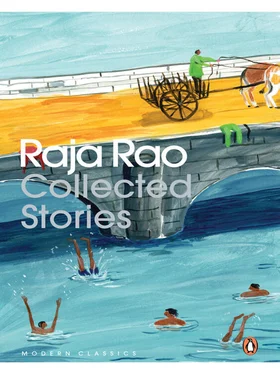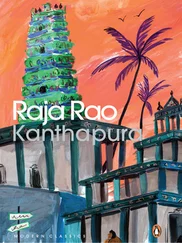Raja Rao - Collected Stories
Здесь есть возможность читать онлайн «Raja Rao - Collected Stories» весь текст электронной книги совершенно бесплатно (целиком полную версию без сокращений). В некоторых случаях можно слушать аудио, скачать через торрент в формате fb2 и присутствует краткое содержание. Год выпуска: 2014, Издательство: Penguin, Жанр: Классическая проза, на английском языке. Описание произведения, (предисловие) а так же отзывы посетителей доступны на портале библиотеки ЛибКат.
- Название:Collected Stories
- Автор:
- Издательство:Penguin
- Жанр:
- Год:2014
- ISBN:нет данных
- Рейтинг книги:5 / 5. Голосов: 1
-
Избранное:Добавить в избранное
- Отзывы:
-
Ваша оценка:
- 100
- 1
- 2
- 3
- 4
- 5
Collected Stories: краткое содержание, описание и аннотация
Предлагаем к чтению аннотацию, описание, краткое содержание или предисловие (зависит от того, что написал сам автор книги «Collected Stories»). Если вы не нашли необходимую информацию о книге — напишите в комментариях, мы постараемся отыскать её.
Collected Stories — читать онлайн бесплатно полную книгу (весь текст) целиком
Ниже представлен текст книги, разбитый по страницам. Система сохранения места последней прочитанной страницы, позволяет с удобством читать онлайн бесплатно книгу «Collected Stories», без необходимости каждый раз заново искать на чём Вы остановились. Поставьте закладку, и сможете в любой момент перейти на страницу, на которой закончили чтение.
Интервал:
Закладка:
But today Madhobha knows there’s business in the air. ‘Brother, how are you?’ asks Madhobha. ‘Well, well, the donkey kicks and the scorpion bites, and I smoke and shout,’ answers Shankar, laughing at himself. ‘I suppose you cannot leave the shop now.’ ‘No, brother, there have been only three clients since the morning. That’s why I could not leave when your brother Ramu came to fetch me. And the boss’s daughter has the fevers. Oh this Benares damp!’ ‘Yes, I had some business with you,’ says Shankar. He now lowers his voice. His voice becomes hoarser when lowered, and seems to come in rough irregular pitches. ‘You see, brother, I have to pay up my exam fees. At the University, they’re not our grandfathers. My only pupil has absconded to his village, and now there’s not even the mite of a mica to be given lessons in mathematics!’ ‘And how much would that be?’ asks Madhobha, scratching his head, and placing his right leg on a roadside boulder. He always had pains after a bout. ‘I need fifty-five rupees. It’s a degree exam you know. And once I pass my BA, I can become a millionaire, if I cared to. You know I am not a fool. I have stood first in physics — well, you don’t know what physics is. It is to do with the earth and the stars and so on. There was a great man, a very white man, called Newton, and he wrote some learned laws — just like, so to say, our Manu’s laws. That Jaunpur Astronomical Magic House, there downtown, is no good. It smells of curdled pandits. To have precision you must have a laboratory. You must come with me one day to the University.’ ‘Yes,’ said Madhobha. He always thought some alchemy could help materialize his Mohini. After all look at the telephone and the aeroplane! ‘I said fifty-five,’ shouted Shankar, ‘but actually I need a hundred. I can’t go to the examination hall in these torn clothes. Can I? They’ll fail me just looking at me.’ True, Shankar’s dhoti was torn all over and his shirt had a patch in the back.
Shankar loved to look like a Bhayya. He hated his father’s paunch, his palace shawls, his clever astrology, his greed for money, and his multicoloured lies. His father told lies ten annas to the rupee. But everybody admired him. ‘Hé Shastri, learned Shastri,’ and so on. And the Hé Shastri, learned Shastri, beat his children warm-heartedly, and sometime even threw firewood at his goddess-looking wife. He went further once and threatened to beat up his daughter-in-law, Padma, that is Shankar’s wife. Padma came from Bangalore and she was the favourite among eight children. Her father was a postmaster, and he was comfortable in his own way. Three thousand rupees dowry she brought the Shastri, and Shankar was tied to her like a bull to an oil-mill. ‘Hoy Hoy,’ you want to say when you think of marriage. Woman and all that, Shankar knew even when he was a boy. What mystery could there be? Already his brother who’s seventeen (and plays such excellent cricket) knows more about women than ever his grandfather did. This is of course not true for Shankar’s grandfather, the great Tyagaraja Shastri who was famous for his dharma sastra learning, was also courted by important Maharajas and singers. Well, he went so often to Laxmi Bai, the singer, that rumour is that the noted Ram Lal, her son, is, as it were, a cousin of Shankar’s father. The world you know is always round whatever you do with it, and the grandfather amassed a fortune reading sacred texts to Maharajas, and giving astrological consultation to concubines, and so the big Chatpadi House solidly stuck on the banks of the Ganges even rises three storeys high, and you’ve accommodation for ten Brahmin families, and at three rupees a month (pre-war rate), now thirty rupees a month (a rupee per day, new rate) they can run a kingdom on it.
The old Shastri is learned all right but nothing like his own father, neither in learning nor in goodness. Shankar is so much like him, even so. ‘Like grandson, like grandfather,’ his father used to say when on some evenings Shankar would come in, his only silk shirt shining on him, and much pan on his lips, bringing in such a powerful smell of rose-attar. ‘The marriage was so splendid,’ he shouts to his mother, who is such a goodly soul. ‘You had pheni and halva and silver-covered pedas. I met the bridegroom. He was a handsome, wonderful fellow.’ All this, everyone knew, was made up. He never went to a marriage. He never met any bridegroom. But all Benares is one gup 1—so one less or one more, who’s there to care.
The father of course knew his father, so he knew his son. Where does the son get money from, became a problem. It transpired that the son was clever in wrestling bets. He applied his mathematics to astrology, and you often get the answer right, especially if you knew the horoscope of the wrestlers. And thus he made twenty or thirty rupees when he was lucky. Sometimes he was all wrong at these bets — and he would disappear, and go and watch ram-fights or cock-fights. And here, you could never know the star of the ram or the cock, brother, how could you? But you did something better. You went and watched that bearded Muslim youth’s face and you could say he was Capricorn (sometimes Western astrology also helped). Or that other middle-aged cockster was a Leo. When Leo meets Capricorn who wins unless that day the other stars were all wrong for the Leo, etc., etc.
And then also, Shankar shouted his lessons in mathematics to his pupil. This brought him twenty or twenty-five rupees a month, and it made up his college fees and his bus or bicycle hire, and a coffee or milk came in by the way.
However, since Padma came into the house, everything was changed. Padma was Padma herself, a lotus-born, and such a gentle, civilized, sweet-voiced girl for this ‘barbarian Benares Brahmin’, he would say of himself. Since the day she came the aspect of the house changed, or so it would seem. His mother loved her first daughter-in-law, and Padma this, and Padma that, made the whole house sing. Sometimes sitting in his class of physics or mathematics, Shankar would suddenly think of Padma, and forget his electrodes before him or the notebook. For Shankar, who knew only how to shout, sometimes fell into compounded silences. At those moments he lost all consciousness of classroom, Benares or Shankar, and be in the real nowhere. Perhaps far away on some other star, or constellation, in some other universe, or just because of a mathematical formula — he felt silence within himself. And nothing moved. He loved these moments. He had them more and more often after Padma came. And when Padma fell at the feet of ‘this barbarian Benares Brahmin’ or the 3Bs as he called himself, he instinctively felt like falling at his wife’s feet in return. How can virtue fall at the feet of vice? So he’d rise and stand, and sometimes suddenly he entered into that august silence. There he saw no one, no, none. Nowadays, he did not even sit for his prayers. This silence could not come from any god, though he believed in God. ‘Aré,’ he would shout, ‘God is there, and whatever we do, he’s like that Moti Ram of the bicycle shop. He hires you his bicycle, even if you haven’t paid him for three months. “Take it and pay it when you like,” he says. God hires us his bicycles and we pay for it when we go to heaven. Here you enjoy, and there you pay,’ he would shout and become silent again.
But since Padma came God is no more a bicycle hirer. God has gone up because without telling anyone Shankar would come back with flowers behind his ears, and a sanctified coconut in his hands. Yes, he’d been to Vishwanathji’s temple. ‘Mother here is prasad. Hé Padma, I have been to Vishwanathji. What do you say to that? May you prosper.’ ‘ Their 2prosperity,’ she says in her deep-set gentle voice, ‘is my riches.’ ‘Yes, yes. But I’m no millionaire. You were brought up on silks. Mother!’ and he suddenly shouts, ‘I am hungry,’ Thus day by day after Padma entered this household he became less and less of a 3B, and everybody wondered. You never smelt perfume any more on him or the sporting of a silk shirt, unless he took mother and Padma to a cinema. He smoked heavily. This he could not stop. How could he? How could he be less of a barbarian: Could the pockmarks change on his face? Could he be anything but a Brahmini bull of the Ganga ghat?
Читать дальшеИнтервал:
Закладка:
Похожие книги на «Collected Stories»
Представляем Вашему вниманию похожие книги на «Collected Stories» списком для выбора. Мы отобрали схожую по названию и смыслу литературу в надежде предоставить читателям больше вариантов отыскать новые, интересные, ещё непрочитанные произведения.
Обсуждение, отзывы о книге «Collected Stories» и просто собственные мнения читателей. Оставьте ваши комментарии, напишите, что Вы думаете о произведении, его смысле или главных героях. Укажите что конкретно понравилось, а что нет, и почему Вы так считаете.












